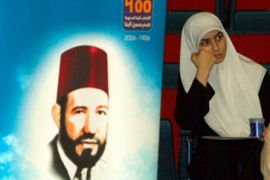Rise of the Muslim Brotherhood
The once banned but now tolerated group has grown into a formidable political force.

 |
| Hassan al-Banna was assassinated in 1949 but his writings influenced a new cadre of Muslim Brotherhood members |
Intially established in a small town in Egypt by Hassan al-Banna, a school teacher, in 1928, the Muslim Brotherhood has grown into a global organisation and is regarded as the oldest organised Islamic movement in modern history.
Al-Banna, who was born in 1906 and had a religious upbringing, was influenced by earlier Muslim scholars such as al-Afghani, al-Kawakibi and Muhammad Rasheed Reda, who wrote on the status of the Arab and Muslim worlds and the urgent need for reform.
Al-Banna wanted to revive the Islamic Ummah – nation – and re-establish it once again as a world leader rather than a follower of nations.
He stated that the Brotherhood’s goals were to establish an Islamic state based on the principles and edicts of the Quran, as well as the sunnah, the oral traditions and actions of the Prophet Muhammad.
He also firmly espoused his opposition to authoritarian rule, which was enshrined in one of the first basic tenets of the Brotherhood: “To confirm unequivocally that people are the source of all power so that it is not permissible for any one individual, party, group or institution to claim the right to authority, or to continue in power except with the consent of the people.”
Methodology
| Arab Unity Rising |
Al-Banna saw in Islam a perfectly forumlated methodology to ensure a healthy, happy and prosperous livelihood for the Ummah; Islam was not merely a religion as it was understood in the west, but a complete way of life.
Islam defined the relationship between man and God, man and fellow man; it also dealt at length with such issues as politics, economics, and the environment. For the Brotherhood, Islam is a social system for the benefit of mankind not just the adherents of the faith.
Al-Banna also said that one of the principle goals of the Brotherhood is to get rid of all foreign occupations of Muslim lands and the elimination of western influence on Muslims.
In more recent times the Muslim Brotherhood group has vehemently opposed the Israeli occupation of Palestine and US occupations of Afghanistan and Iraq.
This is exemplified in the group’s slogan: “Allah is our aim, the Prophet is our leader, the Quran is our Constitution, and Jihad for the sake of God is highest desire”.
Changing stages
| Some principles of the Muslim Brotherhood |
|
Total commitment to, and the respect of, the principle of power exchange through free and fair general elections To confirm the freedom of personal conviction (religious convictions) To confirm the freedom of establishing religious rites for all heavenly religions To confirm the freedom of opinion and the right to publicize it, and to call, peacefully, to it, within the limitations of the moral values of society that are detailed in the first section of the constitution. An important consideration in ensuring the above is the freedom of owning and using the different mass media outlets The right of every citizen( man or woman) to take part in parliamentary elections The right of every citizen to become a member of the parliament through elections The army must stay clear of politics, concentrating only on protecting the country’s external security, and that it should not be used, neither directly nor indirectly, by the governing authority in enforcing its wishes and control, or in prohibiting people’s rights. |
Throughout its 80-year history the Brotherhood has been impacted by three principal transformative stages.
The first – considered its founding stage – when al-Banna laid down the main principles of the movement which spread across Egypt and spilled over into other parts of the Arab World lasted from 1928 to 1949.
During this stage, Al-Banna formed a highly secretive armed wing of the Brotherhood which influenced the behaviour of the group as a whole.
Al-Banna was assassinated in 1949, which ushered in the second stage of the Brotherhood’s development.
The Brotherhood worked closely with the army officers and civilians who participated in the 1952 coup that overthrew the Egyptian monarchy. But soon after, the coup leaders turned against the Muslim Brotherhood and outlawed it and other political movements and parties.
For the next 20 years, the group faced numerous crises including political persecution and imprisonment, chiefly during the 1950s and 60s, under Gamal Abdel Nasser, the Egyptian president.
In 1954, Nasser survived an assassination attempt which he blamed on the Brotherhood and he moved to quickly jail hundreds of its members.
The persecution of the Islamist group pushed many members to flee Egypt to other Arab and Muslim countries, thereby extending the Brotherhood’s influence regionally, and then, globally.
In 1966, Sayyid Qutb, a senior Muslim Brotherhood member was executed by the Egyptian government. A prolific writer, Qutb’s ideologies would survive him and influence the rise of a newer, more radicalised offshoot of Islamists.
Ayman Al-Zawahiri, currently al-Qaeda’s second-in-command, is thought to have been influenced by the execution of Qutb.
Reform
In 1970, Nasser died and was succeeded by Anwar Sadat. The third stage of the Brotherhood’s development began in 1971 and lasts to this day. During this period, the Brotherhood began to reform and adopt increasingly more moderate political positions to appeal to a wider range of people.
The senior leadership in the group came to realise that staying outside the political scene is not benefiting the movement so they decided to form civil political parties to run for elections in Egypt and Jordan. Though the constitutions in both the countries prohibited religioun-based parties from participating in parliamentary elections, civil political parties were exempted.
As a result, throughout the 1990s, the Brotherhood in Egypt and Jordan gained significant foothold in political associations and unions.
In recent parliamentary elections in both the countries, the Brotherhood fielded independent candidates and won the largest share of seats since 1928.
However, the trend was reversed during parliamentary elections in Egypt in 2005 and 2006. The Brotherhood accused the Egyptian government of vote-rigging.
This scenario was repeated in Jordan where the Brotherhood accused the government of vote fraud during the parliamentary and municipal elections in 2007.
But Hamas, the Islamist resistance movement in Palestine which considers itself an offshoot of the Muslim Brotherhood, won a stunning victory in legislative elections in January 2006.
The poll victory stunned the US and Israel who moved quickly to isolate Hamas financially and politically.
Non-violence
As the Brotherhood transformed itself into an effective political outfit, it also outlined its rejection of all manners of violence.
One of the recently adopted tenets states: “… We reiterate our rejection of any form of violence and coercion as well as all forms of coups which destroy the unity of any nation … these methods would create a great crack in the wall of political stability.”
The ideology of the Brotherhood also differs greatly with the one espoused by al-Qaeda. The Brotherhood members distance themselves from the acts and tactics of Al Qaeda.
Human rights are endorsed by the Brotherhood in its published documents.
On the women’s rights issue they have shown a great deal of openness and enlisted women to run for parliamentary elections.
In its March 2004 reform initiative, the Brotherhood declared: “Our only hope to achieve progress in all the aspects of life is by retuning to our religion and implementing our Sharia … We have a clear mission-working to put in place Allah’s law, on the basis of our belief that it is the real, effective way out of our problems-domestic or external, political, economic, social or cultural.
“This is to be achieved by forming the Muslim individual, the Muslim home, the Muslim government, and the state which will lead the Islamic states, reunite the scattered Muslims, restore their glory, retrieve for them their lost lands and stolen homelands, and carry the banner of the call to Allah in order to make the world happy with Islam’s blessings and instructions.”
However, there are members within the Brotherhood who believe that the group should abandon politics and re-focus on providing social services.
